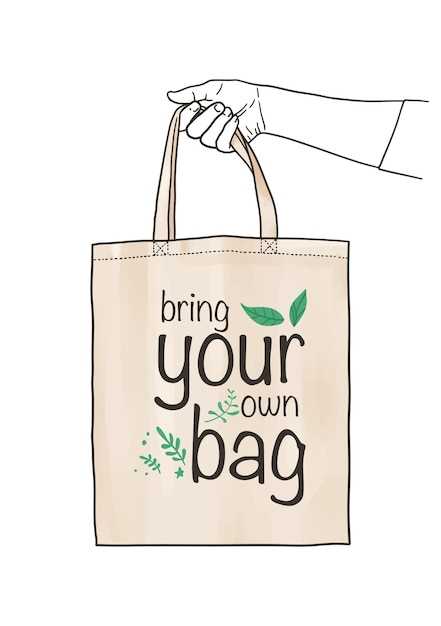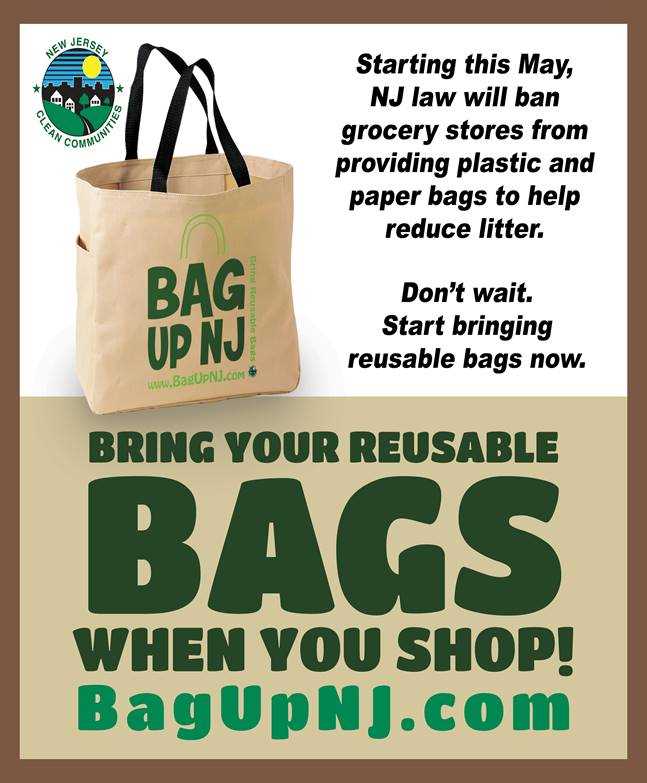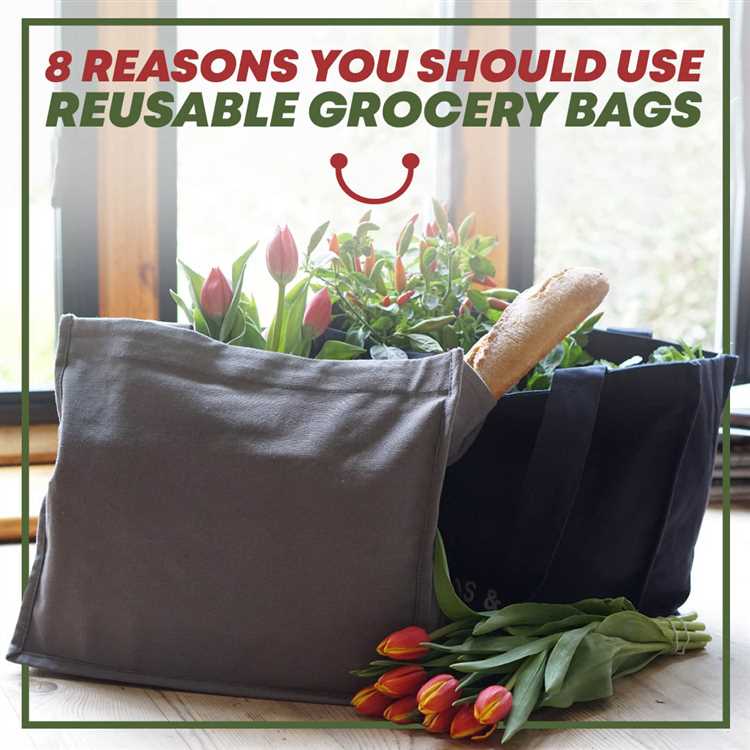Environmental concerns have sparked a growing debate over whether or not to bring your own grocery bags when shopping. While some argue that using reusable bags is a small step towards reducing waste and protecting the planet, others believe that it may not be as beneficial as it seems. Before you make a decision, it’s important to consider the pros and cons of bringing your own grocery bags.
On the pro side, using reusable bags can significantly reduce the amount of plastic waste that ends up in landfills or polluting natural ecosystems. Plastic bags take hundreds of years to decompose, and during that time, they can release harmful toxins into the environment. By using cloth or sturdy reusable bags, you can help decrease the demand for single-use plastic bags and minimize the negative impact on the planet.
Additionally, bringing your own grocery bags can save you money in the long run. Many retailers offer discounts or incentives for customers who bring their own bags, which can add up over time. By investing in a few reusable bags and remembering to bring them with you, you can reap the financial benefits of these promotions and reduce your overall spending.
However, there are also some cons to consider. One argument against using reusable bags is that they can harbor bacteria and pose a health risk if not properly cleaned. It’s important to regularly wash your reusable bags to prevent cross-contamination and the potential spread of pathogens. Another downside is the inconvenience of remembering to bring your bags every time you go grocery shopping. While some people may find it easy to incorporate this habit into their routine, others may struggle to consistently remember, leading to frustration and potentially giving up on the idea altogether.
Ultimately, the decision to bring your own grocery bags is a personal one that requires weighing the pros and cons. While it may require some effort and adjustment, using reusable bags can make a positive impact on the environment and your wallet. However, it’s crucial to ensure that your bags are clean and to stay consistent with bringing them to avoid potential health hazards. By making an informed decision and taking action, you can contribute to a more sustainable future.
- The Environmental Impact of Grocery Bags
- 1. Plastic Pollution
- 2. Fossil Fuel Consumption
- 3. Landfill Space
- 4. Energy Consumption
- The Problem with Single-Use Plastics
- Benefits of Using Reusable Bags
- The Importance of Consumer Choices
- The Benefits of Reusable Grocery Bags
- The Economic Implications
- Question-answer:
- What are the pros of bringing my own grocery bags?
- Are there any cons to bringing my own grocery bags?
- How can bringing my own grocery bags help the environment?
- Do all stores accept reusable grocery bags?
- What are some alternatives to plastic grocery bags?
- What are the pros and cons of bringing my own grocery bags?
- Does bringing my own grocery bags really make a difference?
The Environmental Impact of Grocery Bags
Grocery bags, especially those made of plastic, have a significant environmental impact. They contribute to the problem of plastic pollution, which has become a global issue. Here are some of the key environmental effects of grocery bags:
1. Plastic Pollution
Plastic grocery bags are a major source of plastic pollution. They are lightweight and often end up in water bodies, where they pose a threat to marine life. Turtles, birds, and other sea creatures can mistake them for food and ingest them, causing severe injuries or death. The accumulation of plastic bags in the environment is harmful to ecosystems and wildlife.
2. Fossil Fuel Consumption
The production of plastic grocery bags requires the extraction and processing of fossil fuels. This contributes to greenhouse gas emissions, air pollution, and climate change. Additionally, the transportation and distribution of plastic bags further increase the use of fossil fuels, contributing to the depletion of non-renewable resources.
3. Landfill Space
When not properly disposed of, grocery bags can end up in landfills, taking up space that could be used for more sustainable waste management options. Plastic bags are not biodegradable, meaning they persist in the environment for hundreds of years. This leads to overcrowded landfills and limited space for other waste products.
4. Energy Consumption

The production of plastic bags requires significant energy consumption. This includes the extraction and refining of raw materials, as well as the manufacturing and transportation processes. The energy required to produce grocery bags further contributes to environmental degradation and the overall carbon footprint.
In conclusion, the environmental impact of grocery bags, particularly plastic ones, is substantial. They contribute to plastic pollution, fossil fuel consumption, landfill overcrowding, and high energy consumption. By switching to reusable bags or opting for more environmentally friendly alternatives, we can help mitigate these negative effects and protect our planet.
The Problem with Single-Use Plastics

Single-use plastics, such as grocery bags, water bottles, and food packaging, have become a pervasive issue in our society. These plastics are intended for one-time use and are typically disposed of after a short period of time. However, they pose a significant threat to our environment and public health.
One of the main concerns with single-use plastics is their contribution to plastic pollution. These plastics are often not properly disposed of and end up in our oceans, rivers, and landfills. They can take hundreds of years to decompose, leading to long-lasting environmental damage. Plastic pollution harms marine life, as animals can mistake it for food or become entangled in it. It also affects ecosystems and disrupts the balance of the natural environment. Additionally, the production and disposal of these plastics contribute to greenhouse gas emissions, further exacerbating climate change.
Moreover, the production of single-use plastics involves the extraction and consumption of fossil fuels, which is a limited resource. The manufacturing process releases toxic chemicals into the air and water, posing risks to human health and the environment. These plastics are also usually not recyclable or only partially recyclable, which means that they often end up in landfills or incinerators. This creates additional waste and further strains our waste management systems.
On the other hand, reusable bags offer a sustainable alternative to single-use plastics.
Benefits of Using Reusable Bags
Using reusable bags can substantially reduce the consumption of single-use plastics. By bringing your own grocery bags, you can avoid the need for plastic bags provided by stores. This not only reduces plastic waste but also saves resources and energy required for the production of these bags. Reusable bags are often made from environmentally friendly materials such as cotton or canvas, which are biodegradable and do not contribute to pollution or resource depletion.
In addition, reusable bags are sturdier and more durable than single-use plastic bags. They can carry more weight and withstand multiple uses without tearing or breaking. This makes them more convenient and reliable for shopping trips. Some reusable bags are also designed with insulation, keeping the items inside cool or warm, making them ideal for groceries or long commutes.
The Importance of Consumer Choices
Ultimately, the problem with single-use plastics requires a collective effort to address. While governments and businesses play a crucial role in implementing regulations and promoting sustainable practices, consumers also have a responsibility to make conscious choices. By opting for reusable bags and reducing our reliance on single-use plastics, we can contribute to the preservation of our environment and the long-term well-being of future generations.
The Benefits of Reusable Grocery Bags

Using reusable grocery bags instead of single-use plastic bags offers several benefits for both individuals and the environment:
- Reduced Waste: Reusable grocery bags help to significantly reduce the amount of plastic waste that ends up in landfills and oceans. By choosing to use reusable bags, you can minimize your contribution to the plastic pollution problem.
- Resource Conservation: The production of plastic bags requires significant amounts of resources such as petroleum and natural gas. By using reusable bags, you can help conserve these precious resources and reduce the energy consumption associated with plastic bag production.
- Cost Savings: While there may be an upfront cost to purchasing reusable grocery bags, they can save you money in the long run. Many stores offer discounts or incentives for using reusable bags, and you won’t need to constantly buy new bags every time you go shopping.
- Durability: Reusable grocery bags are typically made from sturdy materials such as canvas or recycled plastics, making them more durable than single-use plastic bags. This means that they can be used multiple times before needing to be replaced, reducing waste even further.
- Convenience: Reusable bags are designed to be more spacious and sturdy than plastic bags, making them easier to carry and less likely to break. Additionally, many reusable bags come with convenient features such as shoulder straps or collapsible designs, making them even more convenient to use.
- Eco-Friendly Choice: Choosing to use reusable grocery bags is a small but impactful step towards a more sustainable future. By using these bags, you are actively contributing to the reduction of plastic pollution and helping to preserve the environment for future generations.
In conclusion, the benefits of using reusable grocery bags outweigh the convenience of single-use plastic bags. By making the switch to reusable bags, you can make a positive difference in reducing waste, conserving resources, and protecting the environment.
The Economic Implications
When it comes to utilizing reusable grocery bags, there are also significant economic implications to consider. While it may seem like a small change, using your own bags can actually have a positive impact on your wallet, as well as the overall economy.
One of the main economic benefits of bringing your own grocery bags is the potential for cost savings. Many grocery stores now charge extra fees for using their own plastic bags, or even offer discounts for bringing your own bags. Over time, these savings can add up and contribute to your overall budget. Additionally, using reusable bags can also reduce the demand for plastic bag production, saving resources and reducing costs for manufacturers.
Furthermore, implementing a reusable bag policy can have positive effects on local businesses. By encouraging customers to bring their own bags, grocery stores can reduce their expenditures on plastic and paper bags, allowing them to allocate those saved funds to other areas of their business. This can lead to increased profits and potentially lower prices for customers.
Additionally, reusable bags can also have a positive impact on the environment, which has its own economic implications. By reducing the demand for plastic bags, fewer resources are needed for their production. This not only saves money, but also helps to conserve natural resources and reduce pollution associated with the manufacturing process.
| Pros | Cons |
|---|---|
| Cost savings | Initial investment in reusable bags |
| Reduces demand for plastic bag production | Potential inconvenience of carrying bags |
| Can lead to increased profits for businesses | Forgetting to bring bags to the store |
| Positive environmental impact | Requires changes in consumer behavior |
In conclusion, the economic implications of bringing your own grocery bags are overwhelmingly positive. The potential for cost savings, increased profits for businesses, and reduced environmental impact make it a logical choice for individuals and society as a whole.
Question-answer:
What are the pros of bringing my own grocery bags?
Bringing your own grocery bags has several advantages. Firstly, it is environmentally friendly as it reduces the need for plastic bags. This means less plastic waste and a healthier planet. Secondly, many stores offer incentives or discounts for customers who bring their own bags. By using your own bags, you can save money. Additionally, reusable bags tend to be sturdier than the flimsy plastic bags provided by stores, making it easier to carry your groceries without worrying about them ripping.
Are there any cons to bringing my own grocery bags?
While there are many benefits to bringing your own grocery bags, there are also a few downsides to consider. Firstly, reusable bags can be bulkier than plastic bags, which means they take up more space in your car or on public transportation. Secondly, remembering to bring your bags with you every time you go shopping can be a challenge. It requires forming a new habit and being organized. Additionally, if you forget to bring your bags, you may have to purchase new ones, which can negate the environmental benefits.
How can bringing my own grocery bags help the environment?
Bringing your own grocery bags is an eco-friendly choice that helps the environment in several ways. By using reusable bags, you are reducing the demand for plastic bags, which take a significant amount of energy and resources to produce. Plastic bags are also non-biodegradable and can take hundreds of years to decompose, leading to pollution and harm to wildlife. By opting for reusable bags, you are reducing plastic waste and minimizing your carbon footprint.
Do all stores accept reusable grocery bags?
Not all stores accept reusable grocery bags, but many do. In fact, numerous stores have adopted policies that encourage customers to bring their own bags. These stores often provide incentives, such as discounts or loyalty points, to customers who use their own bags. It is a good idea to check with your local grocery stores to see if they accept reusable bags and if they offer any rewards for using them.
What are some alternatives to plastic grocery bags?
There are several alternatives to plastic grocery bags. One option is to use paper bags, which are biodegradable and can be recycled. However, paper bags have their own environmental impact, as they require energy and resources to produce. Another alternative is to use reusable cloth bags, which are durable, lightweight, and easy to clean. Some stores also offer compostable bags made from plant-based materials. Ultimately, the best alternative will depend on your personal preferences and values.
What are the pros and cons of bringing my own grocery bags?
One of the pros of bringing your own grocery bags is that it helps reduce plastic waste. By using reusable bags, you can prevent adding more plastic bags to landfills and oceans. Additionally, bringing your own bags can save you money, as many stores offer discounts or incentives for using reusable bags. On the other hand, a con of bringing your own grocery bags is that it requires planning and remembering to bring them each time you go to the store. Forgetting to bring your bags can be inconvenient and may result in having to purchase plastic bags at the store.
Does bringing my own grocery bags really make a difference?
Yes, bringing your own grocery bags can make a significant difference. By using reusable bags instead of plastic bags, you can help reduce the amount of plastic waste that ends up in landfills and oceans. Plastic bags are not easily biodegradable and can take hundreds of years to break down. By choosing reusable bags, you are making a small but important step towards a more sustainable future. Additionally, many stores and cities are now implementing plastic bag bans or charging fees for single-use bags, so bringing your own bags can help comply with these regulations.